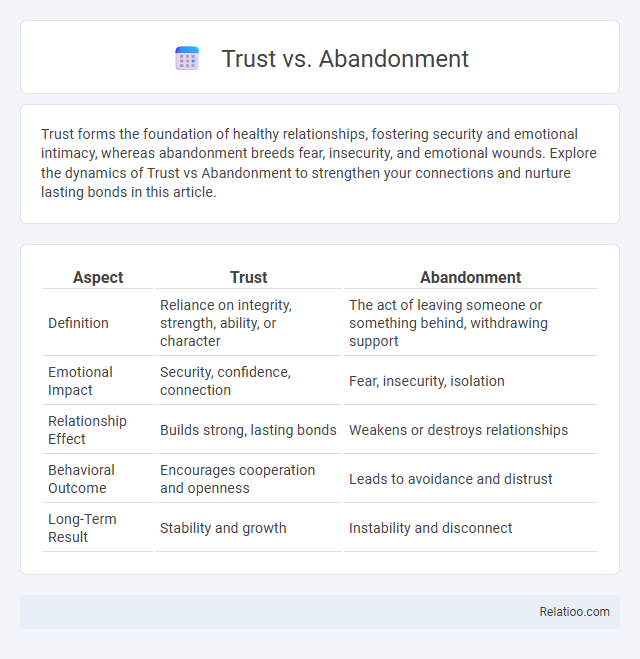Trust forms the foundation of healthy relationships, fostering security and emotional intimacy, whereas abandonment breeds fear, insecurity, and emotional wounds. Explore the dynamics of Trust vs Abandonment to strengthen your connections and nurture lasting bonds in this article.
Table of Comparison
| Aspect | Trust | Abandonment |
|---|---|---|
| Definition | Reliance on integrity, strength, ability, or character | The act of leaving someone or something behind, withdrawing support |
| Emotional Impact | Security, confidence, connection | Fear, insecurity, isolation |
| Relationship Effect | Builds strong, lasting bonds | Weakens or destroys relationships |
| Behavioral Outcome | Encourages cooperation and openness | Leads to avoidance and distrust |
| Long-Term Result | Stability and growth | Instability and disconnect |
Understanding Trust: Foundations and Importance
Trust is the foundation of secure relationships, built through consistent reliability, emotional support, and open communication. Understanding trust involves recognizing its role in fostering safety, reducing anxiety, and promoting healthy attachment patterns. Your ability to develop trust impacts emotional well-being and resilience against feelings of abandonment.
Defining Abandonment in Relationships
Abandonment in relationships refers to the emotional experience of feeling deserted, neglected, or rejected by a partner, often leading to insecurity and mistrust. It can manifest through physical absence, emotional withdrawal, or inconsistent support, significantly impacting attachment and emotional well-being. Recognizing abandonment involves identifying patterns of neglect and addressing underlying fears to foster secure, trust-based connections.
Psychological Impact of Trust
Trust fosters emotional security and resilience, creating a foundation for healthy relationships and personal growth. The psychological impact of trust includes increased self-esteem, reduced anxiety, and a sense of belonging essential for mental well-being. Your ability to establish trust directly influences how you cope with abandonment and form meaningful connections.
How Abandonment Shapes Emotional Well-being
Abandonment profoundly affects emotional well-being by fostering feelings of insecurity, anxiety, and difficulty in forming trusting relationships. Your experiences with abandonment can lead to heightened vulnerability and challenges in managing emotions, often triggering patterns of fear and avoidance. Understanding the impact of abandonment is crucial for developing resilience and healthier emotional connections.
Trust vs Abandonment: Core Differences
Trust vs Abandonment centers on the emotional foundation formed between individuals, where trust involves confidence and security, while abandonment evokes feelings of neglect and loss. Trust builds resilience and positive relationships, whereas abandonment can lead to fear, insecurity, and difficulty forming attachments. Understanding these core differences helps You foster healthier connections and recognize the impact of emotional experiences on mental well-being.
Childhood Experiences and Their Lasting Effects
Childhood experiences of trust versus abandonment profoundly influence Your emotional development and future relationships by shaping core beliefs about safety and reliability. Consistent nurturing fosters secure attachment, promoting confidence and healthy social interactions, while repeated abandonment can lead to anxiety, insecurity, and difficulties in forming stable connections. Early disruptions in trust impact long-term mental health, often requiring targeted interventions to rebuild a sense of safety and emotional resilience.
Rebuilding Trust After Abandonment
Rebuilding trust after abandonment involves consistent communication, emotional transparency, and reliable actions to restore a sense of security. You must address feelings of vulnerability and demonstrate commitment through patience and empathy to heal relational wounds. Establishing boundaries and seeking supportive counseling can enhance trust recovery and foster long-term emotional resilience.
Recognizing Signs of Abandonment Issues
Recognizing signs of abandonment issues involves identifying feelings of insecurity, fear of rejection, and difficulty trusting others. You may experience emotional withdrawal, clinginess, or hypersensitivity to relationship dynamics that trigger past experiences of neglect or loss. Understanding these signs helps in addressing underlying trust concerns and fostering healthier interpersonal connections.
Strategies to Cultivate Trust in Relationships
Cultivating trust in relationships requires consistent communication, reliability, and emotional transparency to counter feelings of abandonment. You can nurture trust by setting clear boundaries, honoring commitments, and actively listening to your partner's concerns to create a secure emotional environment. Building trust also involves forgiveness and patience, allowing both individuals to heal from past experiences of abandonment.
Healing and Moving Forward: Overcoming Abandonment
Healing from abandonment involves rebuilding trust through consistent emotional support and self-compassion. Developing secure attachments and practicing mindfulness helps individuals overcome feelings of rejection and fear of future abandonment. Effective therapy and supportive relationships foster resilience, enabling a positive path forward beyond past trauma.

Infographic: Trust vs Abandonment
 relatioo.com
relatioo.com